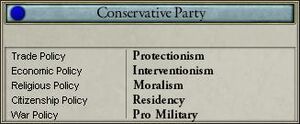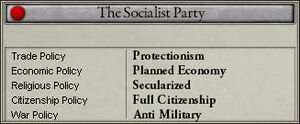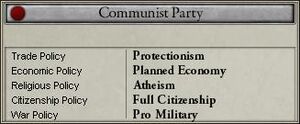意識形態和政黨是《維多利亞2》傳達各種政治觀點的主要工具——維多利亞時代和進步時代政治思想和行動模式的轉變。執政黨和民眾的意識形態對玩家行動的廣度有着很大的影響,決定了這個國家可以進行什麼樣的政治改革和社會改革,以及目前支持哪些政見。
意識形態類型
《維多利亞2》中有七種政治意識形態,每一種都是通過所有可玩國家的數百個獨立政黨表達出來的。這些意識形態代表了更廣泛的政治運動的核心,因此,玩家可以看到在具有相似甚至相同名義意識形態的政黨之間存在不小程度的差異。事實上,每個國家獨特的具體情況會影響各方的立場。儘管如此,對這些政黨背後的意識形態源頭有一個粗略的了解,對於玩家來說是很有用的。
 Conservative
Conservative
Conservatives value order as a social end. Conservatives are the old guard, the arbiters of the status quo, the defenders of tradition and enemies of change. Conservative parties in the Victorian era were markedly different from today's conception of conservative (at least the Anglo-American conception). Conservatives upheld tradition above all else, being reluctant to enact any reform that would threaten the old ways. This means different things for different societies. In an absolute monarchy, the conservatives are likely more "conservative", defending the crown and its values, likely leaning towards moralism, jingoism, residency, state capitalism, and protectionism. In a more liberal nation like Britain or America, conservatives may simply be defending the way things have always been, or perhaps defending the historic role of the state against new liberal ideas of freedom. Expect these parties to sometimes uphold more liberal principles such as free trade, limited citizenship, pluralism, and even laissez faire.
This is ideology most prevalent in the world at the start of the game. Most of the poor strata are conservative-oriented at first, though this usually changes with time. Aristocrats and officers are reliably conservative or reactionary, the more radical cousin of conservatives, detailed below. Other pops may be conservative depending upon their situations, but generally a pop is more conservative when its consciousness is kept low. Conservative is useful because its moderate statism allows a player to exercise some level of control over his country without most of the worst penalties.
保守主義意識形態在遊戲開始時就已存在。
典型政見
- 保護主義: 保守黨傾向於保護主義,儘管這並非鐵則,而且有許多保守黨主張自由貿易。
- 干涉主義: 干涉主義在保守黨中最為常見,儘管也有少數主張自由放任或國家資本主義。
- 道德主義: 保守黨向來倡導道德主義,當然,有些主張多元主義。
- 居留權: 居留權是保守黨的基本觀點,偶爾有主張有限公民權者。
- 擴軍主義: 到目前為止,擴軍主義是保守黨中最常見的立場,不過也有人主張沙文主義。裁軍主義的保守黨可能存在,但很少。
Political Reform Stance
- Conservatives are generally against any political reforms, but can be persuaded to enact reforms as a stop-gap measure when militancy is high. If militancy is low, very few conservatives will support reform.
Each point of militancy, or each 10% of reform movement strength, makes 10% of the conservatives in the upper house willing to back reforms.
Social Reform Stance
- Conservatives are swayed to social reform only with great reluctance. As with political reform, militancy and reform movement strength makes conservatives support reforms.
 反動主義
反動主義
The more extreme cousin to the conservative party, the reactionaries do not stop at the defense of currently upheld tradition, but demand a return to the old ways. In Europe, reactionaries are most often monarchists that uphold the all-powerful state of the absolute monarchy as ideal. In the Americas their positions vary from nativists to monarchists and more. Often non-Western reactionaries are a reaction against Western influences or power within or around the nation in question, for example the Boxers in China.
Reactionaries are likely to be found among aristocrats and officers, but also among the broader population. In a way, reactionary is one of the best parties to play. They are available from the start. If the party is state capitalist, it allows the player a great deal of power over his economic destiny, while jingoism allows players to expand aggressively and protectionism allows high tariffs to fund these projects.
The reactionary ideology exists from the beginning of the game.
Typical Party Issues
- Protectionism: Reactionaries are almost universally protectionists.
- State Capitalism: State capitalism is the most common among reactionary parties, though interventionism is also common. Planned is occasionally seen.
- Moralism: Reactionaries almost never stand for anything less than moralism, as national religious values are often central to their ideals.
- Residency: Residency is the primary reactionary stance, limiting voice in government only to primary culture.
- Jingoism: Jingoism is pretty standard for reactionaries, demanding a minimum level of defense spending. Pro-Military is also conceivable.
Political Reform Stance
- Unlike their compromising brethren in the conservative wing, reactionaries will never, under any circumstance, support political reform. To the contrary, reactionaries will always support the repeal of political reforms, pushing the country back towards a more state-centered, anti-liberal position.
Social Reform Stance
- As with political reforms, social reforms are anathema to reactionaries, and their support is never given to such movements. If given the chance, reactionaries will always support the reduction of social reforms.
自由主義
Liberals favor liberty as the most valued social end. The liberal movement of the 19th century was an extremely important one. The liberals of America and Europe opened up these nations to trade, capitalism, and responsible government. Liberals were a diverse bunch, supporting a wide array of ideas and often conflicting with one another. Universal among them was some vague notion of expanding liberty, in a specific area or broadly. Liberals were often the forward-thinkers, the people who opposed the old state-dominated order and sought to unleash human potential by throwing off the chains the bound people down. Liberals were the cornerstones of the abolitionist movement, the Corn Law repeals in England, the end of the Second National Bank in America, and many more projects aimed at reducing government power over peoples' interactions with one another.
Liberals are often found among capitalists and clerks, and sometime clergy or artisans. Other pops can of course also be liberal, but this is circumstantial. Liberal parties can be difficult to play in Victoria 2, as they often severely limit player options in a variety of fields. This is counterbalanced by reductions in factory costs and a few other perks, but the advantages often seem to be outweighed by the disadvantages. Most players will probably avoid liberal parties because they basically remove economic management as a game component. This can be useful to new players though, or to experienced players who enjoy the idea of a liberal nation and want a bit of challenge.
The liberal ideology exists from the beginning of the game.
典型政見
- 自由貿易: Free trade was one of the first major liberal issues, and most liberal parties are free traders. Some liberal parties still favor protectionism, notably the Republicans in America.
- 自由放任: Liberals uphold freedom above all else, so central economic management is usually shunned. Some liberal parties may mildly advocate interventionism, but nothing further.
- 多元主義: Liberal parties are often in favor of religious pluralism, but are almost as often in favor of secularism. Moralism and atheism are not unheard of, but less common, as liberals generally advocate little to no government role in religion.
- 完整公民權: Liberals tend to advocate full rights for immigrants and minorities on the basis of natural rights, but some liberal parties diverge from this standard and support only limited citizenship or even residency.
- 擴軍主義: The liberal parties vary wildly on the issue of military power. Some liberal parties go so far as to advocate jingoism, while others are pacifistic. Expect moderate pro-military or anti-military stances.
政治改革立場
- Liberals unfailingly support political reform, and under no circumstance will they support a roll-back of political reforms. Representative and transparent government was one of the linchpins of 19th century liberalism.
社會改革立場
- Liberals will only reluctantly support social reforms, usually in cases where militancy has soared. In the game, once reforms are in place, they do not support their repeal (though this is of debatable historical accuracy).
 無政府自由主義
無政府自由主義
無政府自由主義者是自由主義者更激進的表親,他們把人類自由的思想推向了邏輯的極端。雖然自由主義者傾向於改革者,通常是知識分子或權力人物,他們試圖糾正不自由秩序的不合理之處,但無政府自由主義者則完全是另一回事。無政府自由主義者主張國家作為一個實體的終結和所有人的自由平等的存在,可以預期將會毫不動搖地支持最自由的立場。
無政府自由主義者在遊戲的早期,1848年,就已經出現了,這一年是歐洲發生嚴重政治動盪的一年。無政府自由主義者面臨着許多與自由主義者相同的問題和優勢,但由於他們對自由主義立場的一貫支持,這些問題也始終存在。
典型政見
- 自由貿易:無政府自由主義者幾乎普遍支持自由貿易,這嚴重限制了玩家對進口商品徵稅的能力。
- 自由放任:無政府自由主義者最顯著的特徵是他們支持自由主義,所以不要期望在無政府自由黨中看到除此之外的立場。儘管如此,一些無政府主義自由黨卻打破了常規,支持干涉主義,甚至(非常罕見)支持國家資本主義。
- 世俗化:無政府自由主義者會支持各種宗教立場,但通常贊成世俗主義。多元主義和無神論也很普遍,而道德主義則幾乎聞所未聞。
- 完整公民權:無政府自由主義者在支持完整公民權方面非常一致,但有的政黨也可能支持有限公民權。
- 擴軍主義:無政府自由主義者在軍事問題上分歧最大。一些無政府自由主義政黨甚至支持沙文主義,而另一些則支持和平主義。像他們的自由黨同胞一樣,沒有硬性規定,但擴軍主義似乎是最常見的。
政治改革立場
- 無政府自由主義者永遠不會支持頒布或廢除政治改革。這似乎是合乎邏輯的,因為無政府自由主義者不想通過支持改革的倒退而使國家惡化,但也不想通過使國家如他們所想的一樣「自由」來使國家本身合理化。因此,不作為是他們選擇的道路。
社會改革立場
- 無政府自由主義者永遠不會支持社會改革,相反會永遠支持廢除社會改革。雖然政治改革的問題對許多無政府自由主義者來說是個麻煩,但不論當時還是現在,社會福利國家普遍受到無政府自由主義者的憎恨。因此,無政府自由主義者在社會改革問題上會很奇怪地與反動主義者保持一致。這一立場是所有意識形態中最不歷史的,因為在整個歷史上,特別是在19世紀,絕大多數流行的無政府主義形式也是社會主義或其他形式的左派。
 Socialist
Socialist
Socialists believe equality is the paramount value a society must pursue. Socialists seek to use the machinery of the state to take from those that have and give to those that have not. Socialists are available mid-game, around 1860, but often a party will not be available for some time after this date.
Expect socialism to be most prevalent among poor-strata pops, particularly craftsmen and laborers. Socialism is a very powerful force late in the game, and will spread among all populations. Socialism can be a mixed bag for the player. Though it allows a broad degree of economic control, socialist parties often restrict player power over tariff and military policy. The most useful aspect of socialist parties to the player is likely their broad popularity late game, and their ability to implement useful social reforms.
Typical Party Issues
- Free Trade: Socialists broadly support free trade, though they may support protectionism instead.
- Planned Economy: Socialists espouse state-run economic systems and central planning. Anything less than support for planned economy is rare, but state capitalism is possible.
- Secularism: Socialists believe religion to be a private matter, and that the state has no place in religious life. Thus they are overwhelmingly in favor of secularized religious policy, though atheism is upheld by some parties.
- Full Citizenship: Socialists support full citizenship on the basis of humanism, that all people are equal. This policy is widespread among socialist parties and unlikely to be compromised.
- Anti Military: Socialists are usually anti-military, opposing war as a tool of the bourgeois elite to force the universal working class to oppress itself. Pacifism is also possible, and even pro military, but jingoism is out of the question for most parties.
Political Reform Stance
- Socialists will support political reform only when militancy or reform movement power is high, but they never support political reform repeal. This lack of support is perhaps odd due to historically widespread endorsement of political reforms such as universal suffrage by such socialists as Karl Marx (among other reasons these political reforms enfranchised the socialists' voters). However it is likely that the game designers simply wished to make the ideologies more unique rather than completely factually accurate.
Social Reform Stance
- Socialists always support increased social reforms, and will never support their repeal. This is one of the central tenets of the socialist parties, and one of the more useful qualities of the ideology to the player.
 共產主義
共產主義
共產主義者是社會主義者中的激進派。共產主義者並不尋求對現有結構進行和平改革,因為他們認為在資本主義制度下建立的制度,例如代議制民主政體,本身就存在缺陷。共產主義者尋求革命(在必要時,從反革命暴力手中捍衛革命)以及對當前有缺陷的社會秩序的劇變。國家作為一個階級壓迫另一個階級的有力工具,要被無產階級轉為徹底消滅腐朽的資本主義霸主階級。
共產主義者和社會主義者存在於相似的人群中,這些人群屬於工業化社會的下層階級。中間階級也可能有共產主義的同情者,但這樣的人在富裕階級中很罕見。共產主義者在遊戲中期就可以出現,但通常是一個小的邊緣群體,在遊戲後期才有政黨出現。共產主義比社會主義對玩家更友好,堅持更為一致的理想,並在任何意識形態中提供最廣泛的控制範圍。另外,如果他們成功地將國家變為共產主義,這個國家的國旗將會被更換,新國旗通常包含錘子和鐮刀。
典型政見
- 保護主義:和那些過去曾經是自由派的社會主義者不同,共產主義者認為經濟發展不平衡是罪惡的根源,幾乎所有人都反對它,贊成自給自足。
- 計劃經濟:共產主義者是計劃經濟的強硬支持者。中央計劃實現了他們意識形態的最高原則,所以別指望其它。
- 無神論:共產主義者一般相信馬克思的理論,即宗教是對群眾的壓迫(「精神鴉片」),因此它是人民自我實現的障礙。世俗化是可能的,但很少見。
- 完整公民權:共產主義者承認階級鬥爭的存在,認為各民族、各人種的工人同樣受到腐朽資本家的壓迫。因此,完整公民權是一種常態。
- 擴軍主義:共產主義者通常支持擴軍主義。這並不難理解,因為他們經常是資本主義世界政變和侵略的對象。沙文主義也是共產主義者的一個典型,因為用武力傳播世界革命是共產黨人的共同目標。然而,共產黨人有時也可能支持裁軍主義,甚至是和平主義。
政治改革立場
- 與他們的社會主義/社會民主主義兄弟不同,共產主義者反對自由主義者的民主政府理念。他們認為,一個最有階級意識的人組成的強大的先鋒隊,可以像管弦樂隊指揮的溫和領導一樣,高效地管理社會;如果缺乏理想的紀律和階級意識,權利就應當受到限制。因此,他們在必要時支持廢除政治改革,決不支持淡化無產階級的統一意志。
社會改革立場
- 共產黨人把國家看作是一個能使所有人都平等,並提供共同利益的工具。因此,他們總是贊成擴大國家福利,在這個問題上決不讓步。
 法西斯主義
法西斯主義
法西斯是一個奇怪的品種。由於第一次世界大戰後的不滿和文明崩潰,法西斯主義很快獲得了廣泛的追隨者。法西斯主義吸引了社會各界的追隨者,這些支持大多來自中產階級(尤其是中產階級下層)和農村。法西斯主義者通過國家建設的民族共同體來支持民族復興。法西斯政權經常組織森嚴而且手段殘酷。他們在歐洲的崛起是兩次世界大戰期間人民的一個主要特徵,也是引發第二次世界大戰的一個重要因素。
法西斯主義者幾乎在任何人群中都能得到廣泛的支持。但是他們只在遊戲的最後階段才會出現,而他們的政黨通常只在最後十年左右才會出現。法西斯主義是最具多樣性的意識形態之一。它允許任何意識形態的玩家採取廣泛的行動,特別是在法西斯政黨掌權的情況下。法西斯主義允許玩家幾乎完全控制經濟,但仍然允許資本家插手。法西斯主義者的軍事和貿易立場允許玩家在很大程度上控制政策,並且在他們掌權時可以實施各種改革。法西斯政權還有一些很帥的旗幟。
法西斯主義者的信仰狂熱且不妥協,因此,與其他意識形態不同,政黨之間的政策從來沒有任何偏差。法西斯分子永遠支持下面的政見。
典型政見
- 保護主義:法西斯主義者最關心的是國家,或者說「人民」的健康,因此限制了國外市場和「低等民族」的商品。
- 國家資本主義:儘管法西斯主義者傾向於反資本主義,但企業主願意為國家注入資金,使之安全繁榮。
- 道德主義:法西斯主義者懼怕損害國家統一,因此他們只信仰一種宗教,其他宗教都不被容忍,即使是基督教和伊斯蘭教的不同分支也不能共存。
- 居留權:法西斯主義者會把居住在自己祖國的外國人視為對政治的褻瀆,更不用說給他們投票權和其他福利了。
- 沙文主義:法西斯主義者總是奉行擴張主義政策。這通常是為了收復失地,或是奪取弱國的土地。
政治改革立場
- 法西斯主義者很獨特,因為他們是唯一一個既支持實施又支持廢除政治改革的政黨。法西斯在上議院的這種態度取決於法西斯政黨是否執政。如果是,他們會同時支持實施政治改革和廢除政治改革,但如果他們是反對黨,他們將堅決抵制一切變革。
社會改革立場
- 正如他們對政治改革的立場一樣,如果法西斯黨是執政黨,他們同時支持實施社會改革和廢除社會改革。這可能看起來很奇怪,但在歷史背景下是可以理解的。法西斯主義者強烈反對共產主義,如果他們在一個共產主義國家奪取了控制權,他們很可能會取消改革。然而,法西斯主義者也支持對國家採取公有化的做法,強調他們的民族或種族中每個成員的兄弟情誼。這會帶來廣泛的國家福利項目。因此,任何一種選項都是法西斯掌權者的選擇。
Miscellaneous
Data on ideologies can be accessed by locating the Paradox folder in the drive to which it is saved, the navigating to Victoria 2/common/ideologies.txt.






